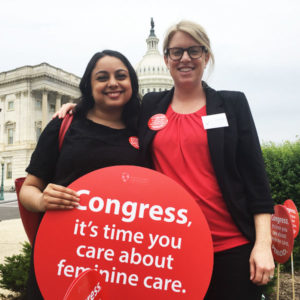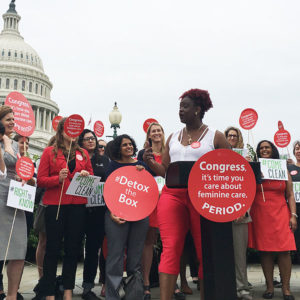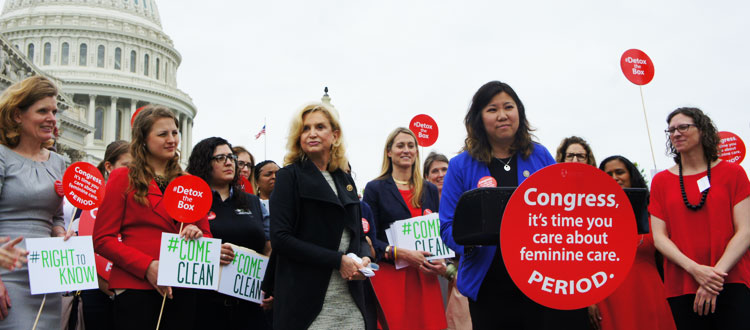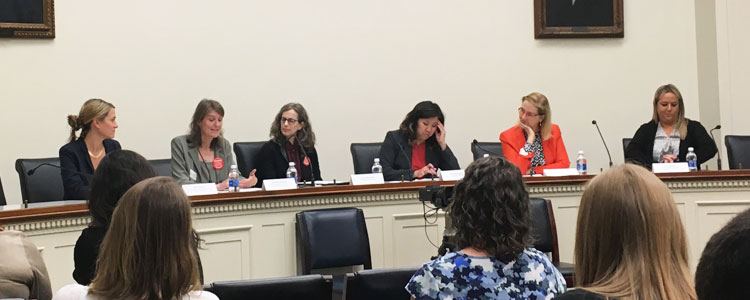#DetoxTheBox: Women Rally in DC for Your Right to Know!
 On average, a woman will use over 16,000 tampons in her lifetime, yet companies aren’t required to tell you what they put in them. Unbelievably, no federal law exists which requires disclosure of all ingredients in feminine products. And because of weak laws that allow toxic chemicals to be used in all kinds of personal care products, you are left in the dark about what chemicals you are putting on some of the most sensitive and absorptive tissue on your body.
On average, a woman will use over 16,000 tampons in her lifetime, yet companies aren’t required to tell you what they put in them. Unbelievably, no federal law exists which requires disclosure of all ingredients in feminine products. And because of weak laws that allow toxic chemicals to be used in all kinds of personal care products, you are left in the dark about what chemicals you are putting on some of the most sensitive and absorptive tissue on your body.
Taking a Stand
At the end of May, women from all over the nation gathered in Washington, DC to rally, lobby and raise awareness about the serious gaps in feminine care product safety. Standing at the steps of Capitol Hill, women spoke from the heart – here is a snapshot into what they said:
It is ridiculous that we know what is in our lotions and shampoos, but we don’t know what is in many of our menstrual hygiene products. As consumers, we evaluate products based on, in part, what they are made of. We do this with cosmetics and we do this with food. But we can’t make informed decisions on which products are best for us if we don’t know what is in them…
And while I am thrilled that there are a few companies that list the ingredients on their tampons and pads, many more manufacturers do not disclose their ingredients. Of the companies that list the ingredients of their menstrual hygiene products on their packaging, there are some that only disclose the ingredients they want to, not all of them. We have no way of knowing for sure. That is why we need transparency. That is why we need to pass the Menstrual Products Right to Know Act. – Congresswoman Grace Meng
Feminine products – from tampons, to pads, to wipes, washes, and sprays is a nearly $6 billion business in the U.S., yet it is woefully under-regulated. The mucous membranes of the vagina are some of the most absorbent tissues on a human body. So when it comes to toxic chemicals that come into direct contact with the vagina, even a little bit really matters…
That’s why we are proud to be partnering with two amazing women in Congress who are leading the charge on Capitol Hill for your right to know and for access to safe feminine products. – Erin Switalski, Executive Director at Women’s Voices for the Earth
Companies continue to market feminine products more aggressively to women of color, so we’re actually disparately impacted by these harmful chemicals — this isn’t new, from nail salons to hair straighteners to workplace hazards, women of color are disproportionally exposed to and harmed by toxic chemicals. But we’re not having it anymore and so I’m excited we’ve all come together today. We’re pushing back on efforts that shame us for having sex or tell us that our vaginas are dirty. We will not be told to hate our bodies so companies call sell us products that are actually hurting us. Women of color deserve better, as do all women, than to have dangerous products pushed on us that negatively impact our health – especially when too many of use struggle to afford quality health care to prevent or treat issues stemming from these products. – Amber Garcia, COLOR (Colorado Organization for Latina Opportunity and Reproductive Rights)
We understand that the only reason a company keeps secrets is because they have their own interests in mind, they don’t have the interests of women and children who are using their products…
We hear that sharing information will reveal confidential business information, that disclosure will impact the bottom line. Seventh Generation stands as a proof point that this argument is absurd. Seventh Generation has shown the world that business can thrive creating feminine products that voluntarily disclose the ingredients in them. – Ashley Orgain, Seventh Generation’s Director of Mission Advocacy & Outreach
 I worry everyday about the chemicals in feminine hygiene products, especially when it comes to my two young girls. Growing up as an African American woman, I often saw products like douches and feminine wipes in my house – it was normal. But there’s nothing normal about these products. Your body is clean and beautiful just the way it is. If more women could access the information about what is in these products and their chemical composition, their ingredients, their links to cancer — I believe less women would use them…
I worry everyday about the chemicals in feminine hygiene products, especially when it comes to my two young girls. Growing up as an African American woman, I often saw products like douches and feminine wipes in my house – it was normal. But there’s nothing normal about these products. Your body is clean and beautiful just the way it is. If more women could access the information about what is in these products and their chemical composition, their ingredients, their links to cancer — I believe less women would use them…
Why is it that we have regulations on the things that we put in our mouths — regulations on what goes into our air and water — but we don’t have regulations on things we put on and in our vaginas? We need strong public health legislation, like Congresswoman Meng’s Menstrual Products Right to Know Act, like Maloney’s Robin Danielson Act — and we need to protect all women from dangerous chemicals. – Tenya Steele, WE ACT for Environmental Justice
I’m here today because most women have no idea what they’re putting in their vagina on a daily basis…
I started Sustain a couple years ago with a mission to empower women to take control of their sexual and reproductive health, with better, safer, healthier products. I looked at all the products available to women in this space and saw not only very few natural options, but also recognized that from condoms to tampons the FDA does not require manufacturers to list ingredients!!! It’s unacceptable to me that in 2017, women still don’t always have access to this information. – Meika Hollender, Sustain
I have a lot of rage about tampons – including that they are sold to us as safe while never having been tested over the long-term. This is not trivial. Just as tampons and pads are not a luxury. Women are overcharged over $120 million dollars a year in 37 states that still tax femcare products. Even more problematic – and the reason we’re here today — there is another tampon tax – and it’s on our health. I stand with everyone here in support of the legislation proposed by Congresswomen Meng and Maloney. – Laura Strausfeld, co-founder of Period Equity
Following the rally, Congresswoman Meng hosted the first-ever menstrual hygiene panel discussion on Capitol Hill about her legislation and other barriers to feminine care. The panel included representatives from Seventh Generation, Period Equity, United Nations Population Fund, Bringing Resources to Aid Women’s Shelters (BRAWS), and WVE’s Director of Science and Research, Alexandra Scranton, who shared insight into hidden toxic chemicals in feminine care products and women’s health.
Raise Your Voice and Reduce Your Exposure
It was a powerful day, but the fight isn’t over and neither is the conversation; when women can speak freely about the products they use near and on their vaginas, we can break the cycle of toxic chemical exposures. Here are ways you can continue to raise your voice and reduce your exposure:
- Support the Menstrual Products Right to Know Act, which requires ALL manufacturers of tampons and pads to disclose ingredients.
- Support the Robin Danielson Feminine Hygiene Product Safety Act, which directs the National Institute of Health to research the impact ingredients in feminine care products may be having on women’s health.
- Look for brands that disclose all ingredients, including what’s in fragrance.
- Eliminate use of products that may be unnecessary to a healthy vagina.
- Choose fragrance-free products.
- Choose chlorine-free bleached or unbleached cotton tampons and pads.
- Download our Chem Fatale fact sheet, and share the information with women and girls you care about.
- If you are having allergic symptoms, switch brands! When you do switch – call the company’s 1-800 customer service to tell them why!
- Tell the FDA if you’ve had symptoms that may be from a feminine care product. Call 1-800-332-1088 or fill out a consumer reporting form (learn how, here).






